|
|
|
Sort Order |
|
|
|
Items / Page
|
|
|
|
|
|
|
| Srl | Item |
| 1 |
ID:
079015
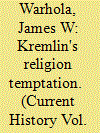

|
|
|
|
|
| Publication |
2007.
|
| Summary/Abstract |
The government could be enticed into taking the bait of religion by enlisting religious points of reference and symbols, and even the Orthodox Church itself, to advance the aims and interests of the state
|
|
|
|
|
|
|
|
|
|
|
|
|
|
|
|
| 2 |
ID:
178298
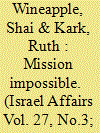

|
|
|
|
|
| Summary/Abstract |
Using primary archival and other contemporary sources, this article explores the relationship between the Christian mission and Israel as a modern Jewish nation-state from its establishment in 1948 until 1965, when section 13a of the Legal Capacity and Guardianship Law, 5722–1962, was enacted in the Israeli Parliament (Knesset). Since the rebirth of the State of Israel, a number of Christian Protestant Churches and missionary organisations have worked to convert Jews to Christianity. The State of Israel opposed such proselytising yet wished to maintain its commitment to freedom of religion as stated in its Declaration of Independence. Furthermore, it did not wish to damage foreign relations with the Christian world.
|
|
|
|
|
|
|
|
|
|
|
|
|
|
|
|
| 3 |
ID:
169978
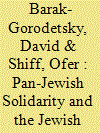

|
|
|
|
|
| Summary/Abstract |
The focus of this article is the 1958 “Who is a Jew?” controversy and David Ben-Gurion’s inquiry into Jewishness leading intellectuals from Israel and the Diaspora regarding how to register a child born to a non-Jewish mother in the Israeli identity card. The article’s main claim is that this correspondence must be understood not only as reflecting a continuous struggle between diaspora and Israeli Jews or between Jews of various religious persuasions, but rather as reflecting a built-in tension between pan-Jewish solidarity and Israeli Jewish sovereignty. This built-in tension seems to prevail today as well, and thus our analysis of the 1958 event may enable a more complex understanding of the continuous and seemingly unresolved tensions within today’s Jewish world.
|
|
|
|
|
|
|
|
|
|
|
|
|
|
|
|
| 4 |
ID:
080169


|
|
|
|
|
| Publication |
2007.
|
| Summary/Abstract |
Why do secular states pursue substantially different policies toward religion? The United States, France, and Turkey are secular states that lack any official religion and have legal systems free from religious control. The French and Turkish states have banned students' headscarves in public schools, whereas the U.S. has allowed students to wear religious symbols and attire. Using the method of process tracing, the author argues that state policies toward religion are the result of ideological struggles. In France and Turkey the dominant ideology is "assertive secularism," which aims to exclude religion from the public sphere, while in the U.S., it is "passive secularism," which tolerates public visibility of religion. Whether assertive or passive secularism became dominant in a particular case was the result of the particular historical conditions during the secular state-building period, especially the presence or absence of an ancien régime based on a marriage of monarchy and hegemonic religion
|
|
|
|
|
|
|
|
|
|
|
|
|
|
|
|
| 5 |
ID:
191000
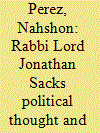

|
|
|
|
|
| Summary/Abstract |
An internationally renowned scholar and theologian, Rabbi Lord Jonathan Sacks (1948–2020), longstanding Chief Rabbi of the United Hebrew Congregations of the Commonwealth (1991–2013), suggested a direct discussion of the State of Israel. By way of exploring the way he viewed the modern State of Israel, this article discusses Rabbi Sacks’ overall communitarian, covenant based ideas before focusing on three categories: national narrative, the invigoration of civil society, and the place of religion. His most distinct criticism relates to the interrelationship between religion, the political system, and the state, illustrated inter alia by his insistence that ‘Judaism must be depoliticised and put back where it belongs, in civil society, far removed from all structures of power’.
|
|
|
|
|
|
|
|
|
|
|
|
|
|
|
|
| 6 |
ID:
166659
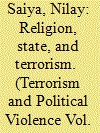

|
|
|
|
|
| Summary/Abstract |
This article investigates two ways in which state involvement in religion—minority and majority restriction—generates terrorism. Using a time-series, cross-national negative binomial analysis of 174 countries from 1991–2009, this study finds that when religiously devout people find themselves marginalized through either form of religious restriction, they are more likely to pursue their aims through violence. The article concludes with recommendations for policymakers.
|
|
|
|
|
|
|
|
|
|
|
|
|
|
|
|
| 7 |
ID:
068599


|
|
|
|
|
| Publication |
New York, Oxford University Press, 2005.
|
| Description |
xxxiv, 410
|
| Standard Number |
0199253625
|
|
|
|
|
|
|
|
|
|
|
|
Copies: C:1/I:0,R:0,Q:0
Circulation
| Accession# | Call# | Current Location | Status | Policy | Location |
| 051095 | 342.0852/AHD 051095 | Main | On Shelf | General | |
|
|
|
|
| 8 |
ID:
165296


|
|
|
|
|
| Summary/Abstract |
This article seeks to determine the accuracy of predictions made by researchers of Israeli politics regarding the disappearance of the consociational model in state‒religion relations, to be replaced by the emergence of a crisis model, which threatens the stability of Israeli democracy. Using a unique methodological tool, based on the relative importance assigned to the issue in the platforms of the parties, we followed the positioning of the issue on the agenda over the years, and investigated whether it was becoming more prominent since the 1990s as an indication of the crumbling of the consociational model. The findings revealed, indeed, that in the late 1990s the tension around religion‒state relations reached its peak and was reflected in a higher rank order on the agenda. However, during the twenty-first century, the tension has not been rising, while the 2015 elections show a dramatic decline in the issue’s positioning on the agenda, which refutes the researchers’ forecast.
|
|
|
|
|
|
|
|
|
|
|
|
|
|
|
|
|
|
|
|
|